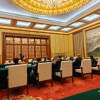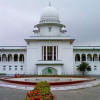Aug 21 grenade attack: Tarique, Babar, all others acquitted
The High Court yesterday acquitted BNP acting chairman Tarique Rahman, former state minister Lutfozzaman Babar and all the others convicted in two cases over the grisly August 21, 2004 grenade attack.
The HC also scrapped the lower court verdicts that convicted and sentenced the 49 accused.
The bench of Justice AKM Asaduzzaman and Justice Syed Enayet Hossain delivered the judgment after a hearing on death references (trial court documents for confirmation of capital punishment) and appeals filed by some of the convicts.
Those who could not file appeals will also benefit from the judgment, said Mohammad Shishir Manir, one of the defence lawyers.
The accused currently behind bars will be released after the HC verdict reaches the jail unless they are imprisoned in any other cases, he said.
The BNP expressed satisfaction at the HC verdict. This has proved that there was a politically motivated conspiracy in these cases.
In the verdict, the High Court said the trial court judgments were illegal since they were delivered through unlawful procedures.
It said substantial changes were made in the supplementary charge sheet which was a completely illegal action, and the trial was based on that charge sheet.
The HC said the supplementary charge sheet was supposed to be submitted before the magistrate concerned first for an examination, but it was directly submitted to the trial court.
The trial court had taken cognisance of the charge sheet without lawful authority, the HC said.
The HC mentioned that the supplementary charge sheet was based on the confessional statement of accused Mufti Abdul Hannan, a leader of the banned militant outfit Harkat-ul-Jihad al-Islami Bangladesh (HuJI).
Hannan was executed in 2017 for another grenade attack targeting the then British high commissioner Anwar Choudhury in Sylhet on May 21, 2004.
The bench said the confessional statements given by the accused were not true as they were coerced into giving the statements in the Taskforce Interrogation Cell, which has no legal basis.
There is no documentary, ocular or circumstantial evidence to prove the charges, the HC said.
It added that there was no eyewitness in the cases and the trial court had delivered the verdicts on hearsay statements.
Details of the HC judgment will be known when its full text will be released.
Contacted, Deputy Attorney General Md Jashim Sarker said the state may challenge the HC judgment at the Supreme Court's Appellate Division after the full text is published.
"I have already given a note to the attorney general for filing an appeal," he said.
Attorney General Md Asaduzzaman told journalists that an appeal should be moved against the HC verdict, but his office will take a decision on the matter after examining the full text.
The two cases -- one for murder and another under the Explosives Substances Act -- were filed after the gruesome grenade attack on an Awami League rally on Bangabandhu Avenue in Dhaka claimed 24 lives and left about 300 injured.
Then opposition leader Sheikh Hasina, who later ran the country for 15 years as prime minister and was forced to resign and flee on August 5 this year following a mass uprising, narrowly escaped the attack.
A judicial inquiry commission formed by the then BNP-led alliance government had found "foreign enemy link" with the attack. The supplementary charge sheet was prepared after the Awami League returned to power.
The Speedy Trial Tribunal-1 of Dhaka delivered the verdicts in the two cases on October 10, 2018, sentencing 19 people, including Babar to death. Tarique, now in London, and 18 others were sentenced to life in jail while 11 others got prison sentences of different terms.
Those sentenced to death also included Abdus Salam Pintu, a former BNP deputy minister, Brig Gen (retd) Rezzaqul Haider, former director of the Directorate General of Forces Intelligence and late Brig Gen (retd) Abdur Rahim, former director general of the National Security Intelligence.
The other 18 persons, who were sentenced to life imprisonment, include late Abul Harris Chowdhury, political secretary to BNP Chairperson and the then prime minister Khaleda Zia; and Kazi Mofazzal Hossain Kaikobad, a former BNP lawmaker, were among those who were sentenced to life imprisonment.
DEFENCE LAWYERS' REACTION
SM Shahjahan, the principal defence counsel for the accused, told reporters that they have got justice because the charges were not proven in terms of evidence as well as law.
He said the HC clearly stated that the conviction of an accused cannot be based solely on the confessional statements of other accused; and criminal conspiracy charges cannot be established solely on a confessional statement.
Besides Hannan's statement, which he later retracted, the HC found no evidence against the accused mentioned in the first charge sheet, Shahjahan said. The names of Tarique, Babar and 28 others were included in the supplementary charge sheet.
The lawyer said a supplementary charge sheet can only be submitted by the investigation officer if he or she finds new evidence. But, in these two cases, the second charge sheet was submitted following a petition filed by the public prosecutor.
Shahjahan added that none of the 225 witnesses, apart from the investigation officer and the magistrate, said he or she had seen who threw the grenades. Nobody in their confessional statements said they had thrown the grenades or seen who threw them.
Shishir Manir, who stood for three of the accused, alleged the confessional statements were extracted through torture as the investigation focused on implicating political opponents instead of identifying the real culprits
"We all want justice for the August 21 incident, but justice cannot be achieved by arbitrarily accusing individuals. This case serves as a lesson that politically motivated charges cannot bring a good outcome."
Zainul Abedin, president of pro-BNP lawyers' association Bangladesh Jatiyatabadi Ainjibi Forum, alleged the Awami League government had used the cases as a political tool.
"They aimed to keep Tarique Rahman out of the country. They even sought the death penalty for him, but the court found no evidence to justify such a sentence," he said.
Kayser Kamal, secretary general of the association, said that the August 21 cases were the "most propagandised legal cases" in Bangladesh's political history over the past two decades.
"The cases were filed to politically undermine Tarique Rahman both nationally and internationally," Kamal said.


 For all latest news, follow The Daily Star's Google News channel.
For all latest news, follow The Daily Star's Google News channel. 








Comments